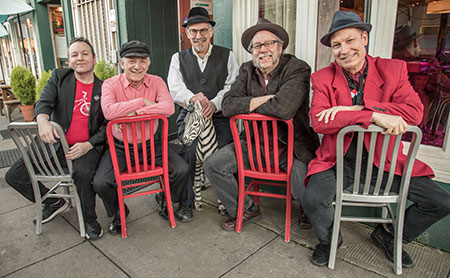
Yankl Falk says it has “very distinctive colors and flavors.” Sophie Enloe describes it as “both deeply sad, and deeply happy.”
What they’re talking about is traditional klezmer music. And this month, Concordians get to hear it for themselves at the second annual Portland Klezmer Music Festival.
The festival, slated for November 2–5 at various locations citywide, will include concerts, jam sessions, educational workshops and a dance party. You can visit bubbaville.org/klezmer for the full lineup of venues and events.
What is Klezmer Music?
Klezmer originated in the Middle Ages among the Jews of Central and Eastern Europe, where it was performed at weddings and other social events. Over time, it took on vestiges of Baroque, Turkish, Romanian, and Greek music as well as German and Slavic folk dancing.
Falk, a Portland clarinetist for over 40 years who’s been described as a ‘luminary of the klezmer world,’ concedes that in 19th century Europe, klezmer’s chief instrument was the fiddle.
But the sound and style of klezmer, like any aspect of traditional culture, changed and evolved over the years. By the early 20th century, klezmer had become popular in the US and by the 1930s, ensembles began including musicians that were influenced by the Big Band and early jazz music of that era. Klezmer bands became larger, developed hybrid forms, and the clarinet was now klezmer’s dominant sound. American Jews were assimilating and so was their music.
As klezmer grew in popularity, the bands got smaller. Falk believes this was because of a dearth of funds to pay musicians during the Depression, combined with improvements in recording equipment. Whatever the reason, the music’s popularity eventually waned until it got rediscovered and revitalized in the 1970s.
Today, klezmer bands can be small or large, include a variety of wind and string instruments, and play traditional, modern, or hybrid forms.
The Festival
The Portland Klezmer Festival was created by Bubbaville, a local nonprofit aimed at educating the public and encouraging appreciation of traditional music and dance. Since its founding in 2008, Bubbaville has hosted dances, concerts, campouts and competitions for artists and patrons of Cajun, country, and other traditional musical forms.
It was Enloe, a fiddle player sitting on the Bubbaville board, who came up with the inspiration for a klezmer festival in 2019. She and treasurer Suzanne Savell wrote grants and scheduled musicians for the first event, scheduled to take place in April 2020. But it got derailed by the COVID pandemic, Enloe says, “so we did some online workshops for musicians instead.”
The Sound of History
Both Enloe and Falk grew up in Jewish homes and have loved klezmer music since they were children.
Enloe’s father was a cantor; a song leader for Jewish worship services, and she says “he would play klezmer CDs for me starting when I was six or seven. When I first heard it, I had a feeling of it sounding familiar, like it was ‘my music’.”
Adds Falk: “It’s deeply personal—it’s the fabric of my upbringing. When I play klezmer, I feel my grandfather’s presence, and I want to pass that down to my grandchildren.”
The festival’s opening concert — featuring Falk and his current band, The Carpathian-Pacific Express as well as The Bieszczady Mountain Boys — is scheduled for 7:30 p.m., Thursday, November 2nd at Alberta Street Pub (1036 NE Alberta St.). The entrance fee is on a sliding scale from $12-15.
Why should you go? Because Falk says, “klezmer is fun, exciting to watch live, and it’s unlike anything you’ve probably heard before.
Dina Sage is the Managing Editor for CNews and enjoys engaging in the arts and outdoor activities. She lives with her husband, daughter and their pets.